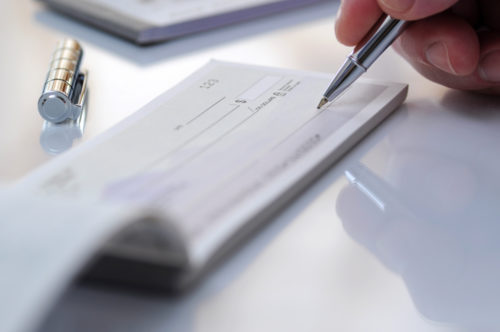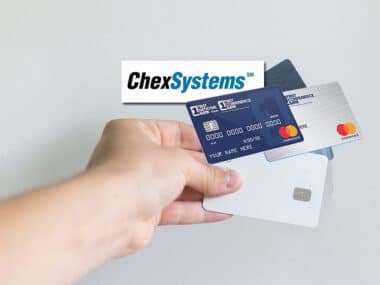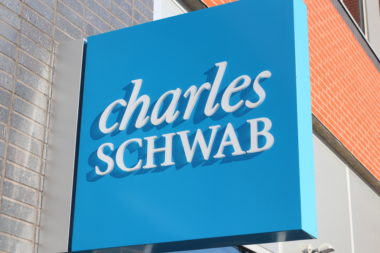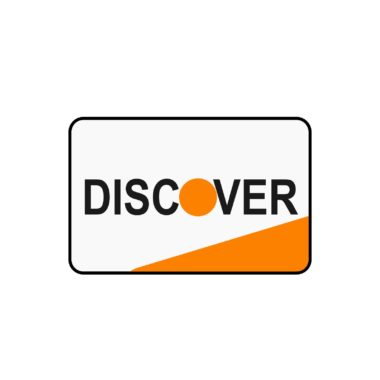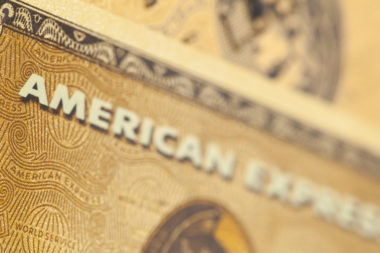Most of us are familiar with the three major credit reporting bureaus. They keep track of our credit history, following how well we take on and pay off debt and using that information to inform potential lenders about us. Most of us have read our credit reports, but not everyone realizes that your credit report isn’t the only financial information available to you.
If you’ve ever tried to write a check and had the vendor deny it, then you’ve probably had experience with TeleCheck or Certegy. Like credit reporting, TeleCheck watches your financial practices and reports them back to vendors. Unlike credit reporting, however, TeleCheck focuses specifically on your check-writing history.
Table of Contents
What Is TeleCheck?
TeleCheck is an agency that tracks consumer data specifically related to checks. Just as loan providers will check your credit history, TeleCheck enables vendors to evaluate your check-writing history before accepting a check from you as payment.
Although personal finance technology is moving more towards cards and digital payments, many people still write checks on a regular basis.
However, unlike a debit card transaction — which immediately checks your bank account for the necessary funds — or a credit card — which draws from your credit card company’s funds — there is a delay between you handing a retailer your check and that check being deposited.
This means that a retailer doesn’t know if your check is good until after you’re long gone.
TeleCheck helps to smooth over some of this information asymmetry by providing retailers with an assessment of you as a consumer. TeleCheck helps retailers answer questions like: should I accept a check from this person? How likely is this check to bounce?
Banks or credit unions will also use TeleCheck — in addition to ChexSystems — when you apply for a checking account. This helps them determine your value as a potential customer before they open an account for you.
How Does TeleCheck Work?
When you write a check for a retailer, they will run that check against the TeleCheck system. Almost instantaneously, TeleCheck will return a recommendation to the retailer: to accept or not to accept your check.
TeleCheck puts some weight behind its recommendations as well. If they say that a check will be good, but it ends up bouncing, TeleCheck will guarantee any check that meets their warranty requirements. However, this guarantee is only available to retailers who follow TeleCheck’s recommendations.
Once the recommendation comes through, it’s up to the retailer to make the decision to accept the consumer’s check or deny it.
What Retailers Use TeleCheck?
If you’re out and about, you’re probably curious whether the retailer you are writing a check for uses TeleCheck. An easy way to tell is by looking for the code that pops up after your check is run through the merchant’s system.
Before running the check, however, you can safely bet that the store uses some sort of process to verify your status and approve your payment. Most establishments use one of the following check verification agencies:
- TeleCheck — Stores, merchants, and retailers;
- Certegy — Stores, merchants, and retailers;
- ChexSystems — Banks, financial institutions, and payroll companies;
- Early Warning Systems — Banks and financial institutions.
TeleCheck and Certegy dominate the retail industry, but there are still retailers that opt to use their own methods of check verification. Instead, they ask for a valid photo ID upon payment, ensuring the validity of the actual check later.
Grocery Stores That Use TeleCheck
Most large chains do employ some sort of check verification. For instance, the following grocery stores use TeleCheck:
- Brookshire’s;
- Giant Food;
- Meijer;
- Save-A-Lot;
- Stater Bros. Markets;
- Stop & Shop.
Harris Teeter, Albertsons, Costco, IGA, Food Lion, King Soopers, Kroger, Piggly Wiggly, Publix, Safeway, Shaw’s, Wegmans, and Winn-Dixie use Certegy. BJ’s Wholesale, Giant Eagle, Hannaford, Food 4 Less, Jewel-Osco, Vons, and WinCo do not use either check verification system. Always check with your local retailer for updated information.
Other Stores That Use TeleCheck
Aside from grocery stores, other retail chains may use TeleCheck. For example:
- CVS;
- Dollar Tree;
- Family Dollar;
- Home Depot;
- Kohl’s;
- Walmart.
In some instances, each specific location will use a different verification service. Walmart and Kohl’s use both Certegy and TeleCheck across various locations.
Bed Bath & Beyond, Best Buy, Big Lots, Dollar General, Lowe’s, Sears, Staples, Target, Rite Aid, and Walgreens all have reported using Certegy. Gamestop, purportedly, does not use a check verification system. Again, always check with your local retailer for the most updated info.
Certegy and TeleCheck are the two players in the check verification game that you will likely run into at any shop. Otherwise, stores will use their own methods of verification. Either way, your checks will be checked more often than not. These agencies just speed up that process.
Are You in the TeleCheck System?
If you are paying with a check for the first time in a while, you may want to know how to find out if you are in the TeleCheck system beforehand. There are a few ways to go about this, such as:
- Requesting your free annual report;
- Asking an agent;
- Assuming that your declined check from five years ago (or less) has kept you in the system.
TeleCheck and other credit reporting agencies are required by the Fair Credit Reporting Act to provide you with a yearly report at no cost. Similarly, TeleCheck will be able to let you know if you are in the system when you call and ask. The preferred contact number to check this sort of thing is under “Returned Check Collection” and currently listed as 1-800-366-1048.
How Long Do You Stay in the TeleCheck System?
If a merchant runs your check through TeleCheck and it is declined, this blip in your report will stay active in their system for approximately five years. This shows up to banks affiliated with the service, preventing you from opening an account with them. Luckily, if you believe this declination was an error, you have the option to dispute it.
How Do You “Beat” TeleCheck?
If you want to bypass the TeleCheck system, there are no real-life cheat codes. If the reason your check is declined is due to personal negligence, you will have to work honestly to improve your standing. There are ways to prepare for a future TeleCheck transaction, such as:
- Paying off outstanding debts;
- Trying out other banking institutions;
- Shopping at retailers that don’t use TeleCheck;
- Waiting it out.
While TeleCheck doesn’t take your credit score in to account, other financial establishments will. If you are having trouble opening a bank account, for instance, it may be worth it to do some research into how to improve your credit.
There are even credit repair companies available if it’s too difficult or time-consuming to tackle on your own. The best way to go about improving your standing with TeleCheck is to wait out the five years and work on your finances in the meantime.
Why Does TeleCheck Decline Checks?
The TeleCheck algorithm is proprietary, so consumers can only guess at exactly how their checking habits are being evaluated. However, there are a few factors that are likely to play a role in the TeleCheck system:
- Checking history: If you have a history of checks bouncing, TeleCheck will take that into account and be more cautious about issuing an “accept” recommendation for your current check.
- Purchase type: Some purchases are riskier than others. For example, TeleCheck is more likely to be suspicious of a $15,000 check written for a new car than a $15 check written for a burger and soda.
- Other debts: TeleCheck will take into account how much debt you have elsewhere. Just like with your credit score, having lots of outstanding debt can make it difficult to use a check for new big purchases.
- Check-writing history: Having a long history of writing good checks will count in your favor. Having a history of very few checks will make TeleCheck a little warier.
- Account fraud: If your identity has been stolen, the thieves may have damaged your checking history.
It’s important to remember that a merchant may decline your check even if your TeleCheck record is good. Make sure to view your TeleCheck record personally before jumping to conclusions. You can also ask the merchant for the code that popped up when your check was declined, and use this to inform your next steps.
What Do TeleCheck Codes Mean?
When your check is declined, the merchant using TeleCheck will see a code appear on their system. This gives them insight into why the method of payment may have been declined, and you can ask for this code and research it yourself with TeleCheck’s code lookup feature. You just need the decline code and the last four digits of the bank account associated with the declined check.
There are some consistencies in codes across merchant systems. For example, Clover works with TeleCheck, providing the following messages on the interface:
- Any four-digit number — Approved;
- Four-digit number and “keep check for deposit” — Approved but requires manual deposit at a bank;
- TeleCheck Code 3 — No negative information on the consumer, but marked as outside of established guidelines and, therefore, declined;
- TeleCheck Code 4 — Negative information on the consumer is detected by the system and is, therefore, declined;
- TeleCheck Code 40 — The ID or check has been reported lost or stolen and is, therefore, declined;
- Check Invalid — The check does not meet accepted printing standards.
Those codes align with most of the codes you can expect to see from a merchant using TeleCheck. There are also messages to merchants including “Call Center” and “Data Entry Error.” These are self-explanatory and require no further action from the writer of the check. If you received a code that you disagree with or require further information, it’s always best to go straight to the source.
How to Contact TeleCheck
Contacting TeleCheck directly is the best way to learn about how retailers view your checks. This can be a good idea if you’ve had a lot of declined checks recently or if you’re doing a routine check-up for identity fraud.
Order Your TeleCheck File Report
You can order your TeleCheck report from the TeleCheck website. Be sure to have the following items handy:
- Your current driver’s license;
- Your Social Security card;
- A check with your account number and the routing number for your bank.
Otherwise, you can send a request for your report to TeleCheck by mail. If you do this, you will want to send your request to:
TeleCheck Services, Inc.
Attention: Consumer Resolution Services
P.O. Box 6806
Hagerstown, MD 21741-6806.
If you reach out via mail, be sure to include the following with your request:
- A daytime phone number;
- A photocopy of your driver’s license;
- Your Social Security number;
- A voided check that includes your account number and routing number.
Dispute Your TeleCheck Report
If you discover an error on your TeleCheck report, you should dispute the accuracy of that report. The fastest way to file a TeleCheck dispute is through the TeleCheck website.
Unlike the e-OSCAR system, which investigates credit report disputes, TeleCheck’s online dispute form will allow you to attach supplemental documents that support your dispute.
If you prefer to reach out via mail, there is a PDF form on the TeleCheck website that you can print out and mail to the address listed above.
TeleCheck is an important system that allows retailers to assess the risks of accepting a check for payment, but it is not without its flaws. Be sure to request a copy of your TeleCheck report if you pay with checks often and make sure that the information contained therein is accurate
Image Source: https://depositphotos.com/
